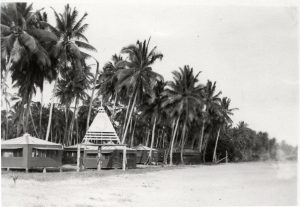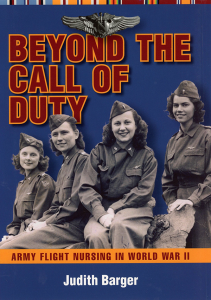Meet the former US Army flight nurses whom I interviewed for
Beyond the Call of Duty: Army Flight Nursing in World War II.
In 1986 as part of my research about flight nurse history and coping with war, I was privileged to interview 25 former US Army nurses about events of their flight nurse duty in World War II. Most of them are now deceased, but their stories live on in Beyond the Call of Duty: Army Flight Nursing in World War II.
The journal I kept of my time with each of them in 1986 when writing my dissertation offers a brief personal glimpse of these remarkable women. I am sharing edited versions of these journals, in the order in which the interviews took place. The actual interviews are in separate documents.
6th Interview
Clara Morrey Murphy
802 MAES Mediterranean
19 April 1986
I talked with Clara Murphy this afternoon in her home in San Antonio, Texas. She was casually dressed in slacks and a top and had been to the hairdresser earlier that day. I learned that today is her wedding anniversary — the 38th, I believe — and that she and her husband Bob were going to a party in their honor that evening.
Clara was very gracious and friendly, but somewhat reserved and not as spontaneous as other women whom I’ve interviewed. She offered me a cup of coffee — but didn’t have one herself — and later asked me if I’d eaten lunch. Although I hadn’t, I couldn’t ascertain why she was asking, and I didn’t want to impose on her for food unless, of course, she had not eaten either. I simply didn’t pursue it. Now I hope she wasn’t going without lunch on my account!
Clara seemed uncertain of exactly what I wanted us to talk about. To help ease her mind about the interview, I briefly explained the types of things I would ask her.
Before starting the interview, Clara suggested that I read a letter she had written some years back to one of the medical technicians in the 802nd squadron who was writing a book about her best friend Adela Lutz — or Lutzie, as Clara called her — who was killed in a plane crash while on duty with the 802nd. Everyone on the plane, including the crew and all 15 patients, perished in the crash. Then Clara showed me a scrapbook belonging to Annetta, a civilian nurse friend, that included letters Clara had written to her as well as newspaper clippings about Clara. Finally Clara showed me some photographs of flight nurses in her squadron and of herself during World War II.
Clara seemed more concerned about the aspect of coping with war than the other women I’ve interviewed so far. In fact, I learned toward the end of our interview that she had written herself several pages of notes about coping to help her remember what she wanted to share with me. She didn’t go into much detail but simply read what she had written — such things as the importance of esprit de corps, letters from home, and religion in helping her to cope.
We socialized for some time after the interview, which had gotten started late, but I was concerned that I might be overstaying my welcome, since Clara and her husband had the party to attend that night.
One of Clara’s stories: Clara laughed as she remembered the flight nurses’ arrival at Maison Blanche, North Africa after their journey overseas by troop ship. “We considered ourselves going forward [toward the front lines of battle], so we put on all of our clothes that were issued to us — our fleece lined clothes. And we put our gas masks on. And we noticed everybody out on the deck looking at us, and we found out later that they really got a lot of enjoyment out of seeing us in all that gear. Whatever gear we were issued, we had on.”
Clara died in 2013.


